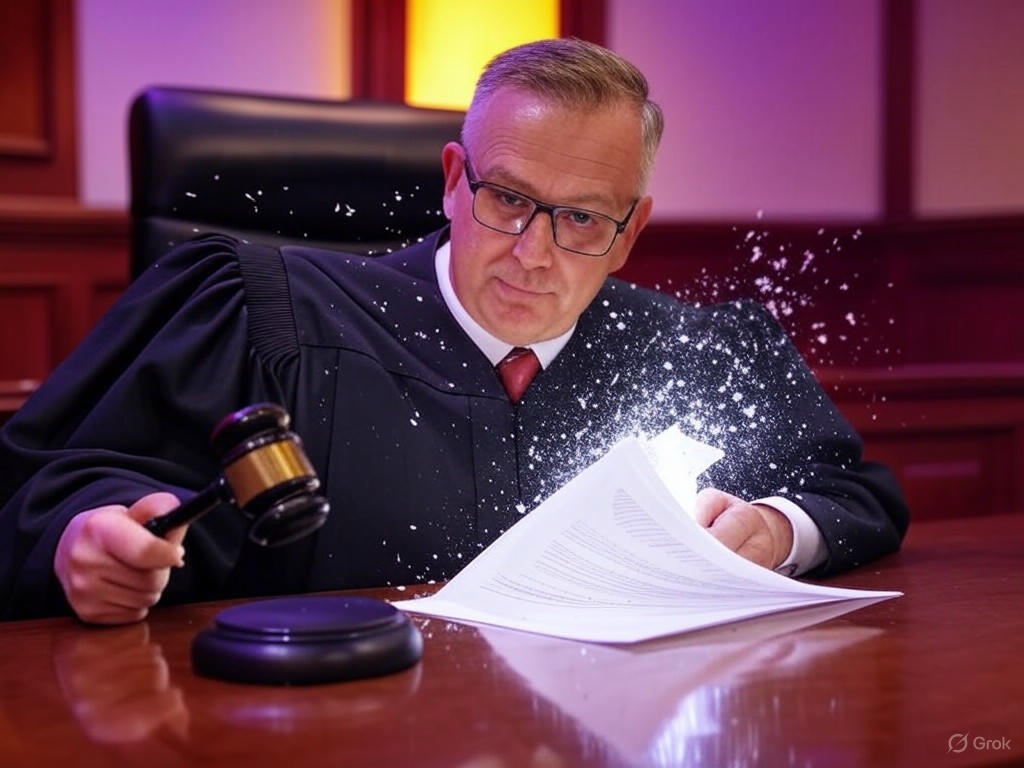
Unconstitutional Trump Order Struck Down by Judge for Perkins Coie
Overview of the Landmark Ruling
In a bold move that underscores the strength of America’s constitutional safeguards, a federal judge has invalidated the unconstitutional Trump order targeting Perkins Coie, a leading law firm. This decision, handed down by U.S. District Judge Beryl Howell, not only protects the firm’s right to represent clients freely but also serves as a stark reminder of the boundaries of executive authority. Have you ever considered how such rulings can shield professionals from political vendettas?
The unconstitutional Trump order was deemed an assault on core democratic values, including free speech and legal independence. This ruling highlights the judiciary’s role in maintaining balance, ensuring that no single branch oversteps its limits.
The Scope and Impact of the Unconstitutional Trump Order
President Donald Trump’s executive order, issued in March, aimed to punish Perkins Coie for its work with Democratic clients, labeling it as “dishonest and dangerous.” This unconstitutional Trump order included directives that could have crippled the firm’s operations, raising alarms about retaliation in politics.
- Suspending security clearances for Perkins Coie’s attorneys, which would limit their access to sensitive information.
- Terminating all government contracts, potentially devastating the firm’s revenue streams.
- Ordering investigations into hiring practices by the Equal Employment Opportunity Commission.
- Restricting firm lawyers from government facilities, effectively isolating them from key networks.
Experts warn that this unconstitutional Trump order set a dangerous precedent, potentially chilling the willingness of lawyers to take on controversial cases. Imagine if every political disagreement led to professional blacklisting—it’s a scenario that could erode trust in our legal system.
Key Findings from Judge Howell’s Decision
Judge Howell’s 102-page ruling dissected the unconstitutional Trump order, finding it rooted in retaliation and viewpoint discrimination. She argued that such actions violate the First Amendment by punishing attorneys for their affiliations.
- It was motivated by a desire to target Perkins Coie for representing unpopular views, which directly contravenes constitutional protections.
- The order represented an abuse of power, undermining the principles of democracy.
- Government retaliation against legal representation threatens the very foundation of justice.
“No American President has ever before issued executive orders like the one at issue, targeting a prominent law firm with adverse actions,” Judge Howell wrote, emphasizing the need for tolerance over coercion in response to dissent.
This decision not only defends Perkins Coie but also reinforces broader safeguards against the unconstitutional Trump order’s tactics, ensuring lawyers can advocate without fear.
Implications of the Unconstitutional Executive Action
The fallout from the unconstitutional Trump order extends beyond this case, influencing ongoing challenges from firms like WilmerHale and Jenner & Block. It’s likely to shape how future administrations handle political disagreements through legal channels.
For instance, this ruling could prevent similar attempts to weaponize executive power, offering a blueprint for accountability. As legal experts point out, it’s a win for anyone who values unbiased representation in court.
Broader Context: Executive Power and Political Retaliation
The unconstitutional Trump order didn’t emerge in isolation; it was part of a larger pattern of targeting law firms perceived as adversarial. This approach raised questions about the erosion of democratic norms and the rule of law.
Trump’s Campaign Against Legal Firms
Perkins Coie was just one target in a series of executive actions, with other firms facing similar threats. Some chose to negotiate, offering pro bono work to avoid penalties, which highlights the pressure tactics at play.
This situation illustrates how political retaliation can coerce compliance, potentially costing the legal sector millions. If you’re in the legal field, this might make you think twice about client selection—but remember, your right to choose is protected.
Defending First Amendment Rights
At its core, the ruling on the unconstitutional Trump order reaffirms that viewpoint discrimination is unacceptable. Lawyers must be free to represent clients without government interference, a principle that’s essential for a healthy democracy.
- Viewpoint discrimination remains a key issue, as it stifles free expression and debate.
- Judicial oversight provides a vital check, preventing power abuses and maintaining equilibrium.
Consider a hypothetical: If a lawyer defends a controversial cause, should they face retribution? This case says no, offering actionable insight for professionals navigating politically charged environments.
Potential Appeals and Future Developments
With the unconstitutional Trump order now struck down, appeals are on the horizon, potentially escalating to higher courts. The Department of Justice’s response could define the next chapter in this saga.
Legal analysts predict this will become a reference for balancing executive actions with constitutional rights. Staying informed on these developments is crucial—perhaps follow related cases to see how they evolve.
As debates continue, tips for readers include documenting any potential retaliation and seeking legal advice early, ensuring you’re prepared if similar issues arise.
Reactions from Legal Experts and the Community
The decision has sparked widespread praise, with constitutional scholars calling it a bulwark against political intimidation. One professor noted, “This ruling defends the independence of the legal profession, a cornerstone of justice.”
- Experts emphasize the judiciary’s role in curbing executive overreach.
- Advocates argue it’s a timely reminder of democracy’s resilience, especially in polarized times.
This positive reception underscores why protecting free speech matters—it’s not just about one firm, but about fostering an environment where ideas can flourish without fear.
Enduring Lessons and a Call to Action
The unconstitutional Trump order’s downfall teaches us about the risks of mixing politics with legal punishment, urging a recommitment to impartial governance. Lawyers should feel empowered to represent clients boldly, knowing the system has checks in place.
As this case moves forward, consider how it impacts your view of executive power. What are your thoughts on this ruling? Share in the comments below, or explore related topics on our site for more insights into constitutional rights.
We invite you to engage—perhaps by discussing with colleagues or even volunteering for organizations that defend legal freedoms. Let’s keep the conversation going to strengthen democracy together.
References
The following sources were used to inform this article:
- Politico. (2025, May 2). Trump’s executive orders against law firms face challenges.
- OPB. (2025, May 3). Judge strikes down Trump order on Perkins Coie.
- Hakimi Sadr. (2024, December). Relevant legal analysis document.
- Columbia Law Review. (2025, April). Executive power and constitutional limits.
- Georgetown Law. (2020, February). Perspectives on legal independence.
- Consumer Reports Advocacy. (2022, November). Related advocacy on rights.
- AALS. (2016, December). Legal education and democracy.
- Experts Blog. (n.d.). Expert witness insights.
unconstitutional Trump order, Perkins Coie, federal judge ruling, Trump executive order, law firms retaliation, constitutional rights, executive power limits, First Amendment protections, legal independence, political retaliation







